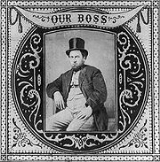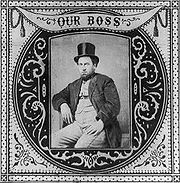
Political boss
Encyclopedia

Political science
Political Science is a social science discipline concerned with the study of the state, government and politics. Aristotle defined it as the study of the state. It deals extensively with the theory and practice of politics, and the analysis of political systems and political behavior...
, is a person who wields the power over a particular political region or constituency. Bosses may dictate voting
Voting
Voting is a method for a group such as a meeting or an electorate to make a decision or express an opinion—often following discussions, debates, or election campaigns. It is often found in democracies and republics.- Reasons for voting :...
patterns, control appointments, and wield considerable influence in other political processes. They do not necessarily hold public office themselves. In fact, most historical bosses did not.
Bosses were a major part of the political landscape during the 19th and early 20th centuries in the United States. One of the most powerful of these was James A. Farley who was the chief dispenser of Democratic Party patronage during Franklin D. Roosevelt
Franklin D. Roosevelt
Franklin Delano Roosevelt , also known by his initials, FDR, was the 32nd President of the United States and a central figure in world events during the mid-20th century, leading the United States during a time of worldwide economic crisis and world war...
's New Deal
New Deal
The New Deal was a series of economic programs implemented in the United States between 1933 and 1936. They were passed by the U.S. Congress during the first term of President Franklin D. Roosevelt. The programs were Roosevelt's responses to the Great Depression, and focused on what historians call...
administration. Farley parlayed his position as Democratic National Committee boss into a run for the Democratic nomination for President in 1940. Farley had been elected to public office only once, to the New York State Assembly, an office that he held for only one year: 1922-23. In the South, charismatic populist
Populism
Populism can be defined as an ideology, political philosophy, or type of discourse. Generally, a common theme compares "the people" against "the elite", and urges social and political system changes. It can also be defined as a rhetorical style employed by members of various political or social...
politicians like Huey Long
Huey Long
Huey Pierce Long, Jr. , nicknamed The Kingfish, served as the 40th Governor of Louisiana from 1928–1932 and as a U.S. Senator from 1932 to 1935. A Democrat, he was noted for his radical populist policies. Though a backer of Franklin D...
commanded large networks of supporters. Similar practices existed in the northern cities, particularly New York City
New York City
New York is the most populous city in the United States and the center of the New York Metropolitan Area, one of the most populous metropolitan areas in the world. New York exerts a significant impact upon global commerce, finance, media, art, fashion, research, technology, education, and...
, where Boss Tweed
Boss Tweed
William Magear Tweed – often erroneously referred to as William Marcy Tweed , and widely known as "Boss" Tweed – was an American politician most notable for being the "boss" of Tammany Hall, the Democratic Party political machine that played a major role in the politics of 19th century...
(arguably the most infamous political boss) wielded control over the powerful Democratic political machine
Political machine
A political machine is a political organization in which an authoritative boss or small group commands the support of a corps of supporters and businesses , who receive rewards for their efforts...
. In Denver, Colorado during the 1890s there was Jefferson Randolph "Soapy" Smith
Soapy Smith
Jefferson Randolph "Soapy" Smith II was an American con artist and gangster who had a major hand in the organized criminal operations of Denver, Colorado; Creede, Colorado; and Skagway, Alaska, from 1879 to 1898. He was killed in the famed Shootout on Juneau Wharf...
who operated as the Republican party boss and political fixer.
Charles Brayton exercised great influence over the politics of turn-of-the-century Rhode Island
Rhode Island
The state of Rhode Island and Providence Plantations, more commonly referred to as Rhode Island , is a state in the New England region of the United States. It is the smallest U.S. state by area...
and was an example of bossism within the Republican Party. Analogues could be found in most other urban area settings such as the Chicago Democratic Machine and the political racket of E. H. Crump
E. H. Crump
Edward Hull "Boss" Crump was an American politician from Memphis, Tennessee. He was mayor from 1910 through 1915, and again briefly in 1940; in the intervening years he effectively appointed the mayors.-Career:...
in Memphis, Tennessee
Memphis, Tennessee
Memphis is a city in the southwestern corner of the U.S. state of Tennessee, and the county seat of Shelby County. The city is located on the 4th Chickasaw Bluff, south of the confluence of the Wolf and Mississippi rivers....
.
The HBO television series Boardwalk Empire focuses Enoch "Nucky" Thompson (based on the historical Enoch L. Johnson
Enoch L. Johnson
Enoch Lewis "Nucky" Johnson was an Atlantic City, New Jersey political boss and racketeer. From the 1910s until his imprisonment in 1941, he was the undisputed “boss” of the Republican political machine that controlled Atlantic City and the Atlantic County government...
), a Republican Party boss who rose to prominence and controlled Atlantic City, New Jersey
Atlantic City, New Jersey
Atlantic City is a city in Atlantic County, New Jersey, United States, and a nationally renowned resort city for gambling, shopping and fine dining. The city also served as the inspiration for the American version of the board game Monopoly. Atlantic City is located on Absecon Island on the coast...
during the Prohibition
Prohibition
Prohibition of alcohol, often referred to simply as prohibition, is the practice of prohibiting the manufacture, transportation, import, export, sale, and consumption of alcohol and alcoholic beverages. The term can also apply to the periods in the histories of the countries during which the...
period of the 1920s and 1930s
Bossism
Bossism
Bossism, in the history of the United States , is a system of political control centering about a single powerful figure and a complex organization of lesser figures bound together by reciprocity in promoting financial and social self-interest...
is generally associated with corruption
Political corruption
Political corruption is the use of legislated powers by government officials for illegitimate private gain. Misuse of government power for other purposes, such as repression of political opponents and general police brutality, is not considered political corruption. Neither are illegal acts by...
and organized crime
Organized crime
Organized crime or criminal organizations are transnational, national, or local groupings of highly centralized enterprises run by criminals for the purpose of engaging in illegal activity, most commonly for monetary profit. Some criminal organizations, such as terrorist organizations, are...
and has often been regarded as subversive to the democratic process. Nevertheless, it has been common practice since the Roman Republic
Roman Republic
The Roman Republic was the period of the ancient Roman civilization where the government operated as a republic. It began with the overthrow of the Roman monarchy, traditionally dated around 508 BC, and its replacement by a government headed by two consuls, elected annually by the citizens and...
, and remains fairly widespread today, particularly in undeveloped nations. An element of bossism remains in most political environments, albeit arguably to a far lesser extent than it once did.
See also
- BossismBossismBossism, in the history of the United States , is a system of political control centering about a single powerful figure and a complex organization of lesser figures bound together by reciprocity in promoting financial and social self-interest...
- CaciqueCaciqueCacique is a title derived from the Taíno word for the pre-Columbian chiefs or leaders of tribes in the Bahamas, Greater Antilles, and the northern Lesser Antilles...
- CorporatismCorporatismCorporatism, also known as corporativism, is a system of economic, political, or social organization that involves association of the people of society into corporate groups, such as agricultural, business, ethnic, labor, military, patronage, or scientific affiliations, on the basis of common...
- Crony capitalismCrony capitalismCrony capitalism is a term describing a capitalist economy in which success in business depends on close relationships between business people and government officials...
- Political corruptionPolitical corruptionPolitical corruption is the use of legislated powers by government officials for illegitimate private gain. Misuse of government power for other purposes, such as repression of political opponents and general police brutality, is not considered political corruption. Neither are illegal acts by...
- Political machinePolitical machineA political machine is a political organization in which an authoritative boss or small group commands the support of a corps of supporters and businesses , who receive rewards for their efforts...

